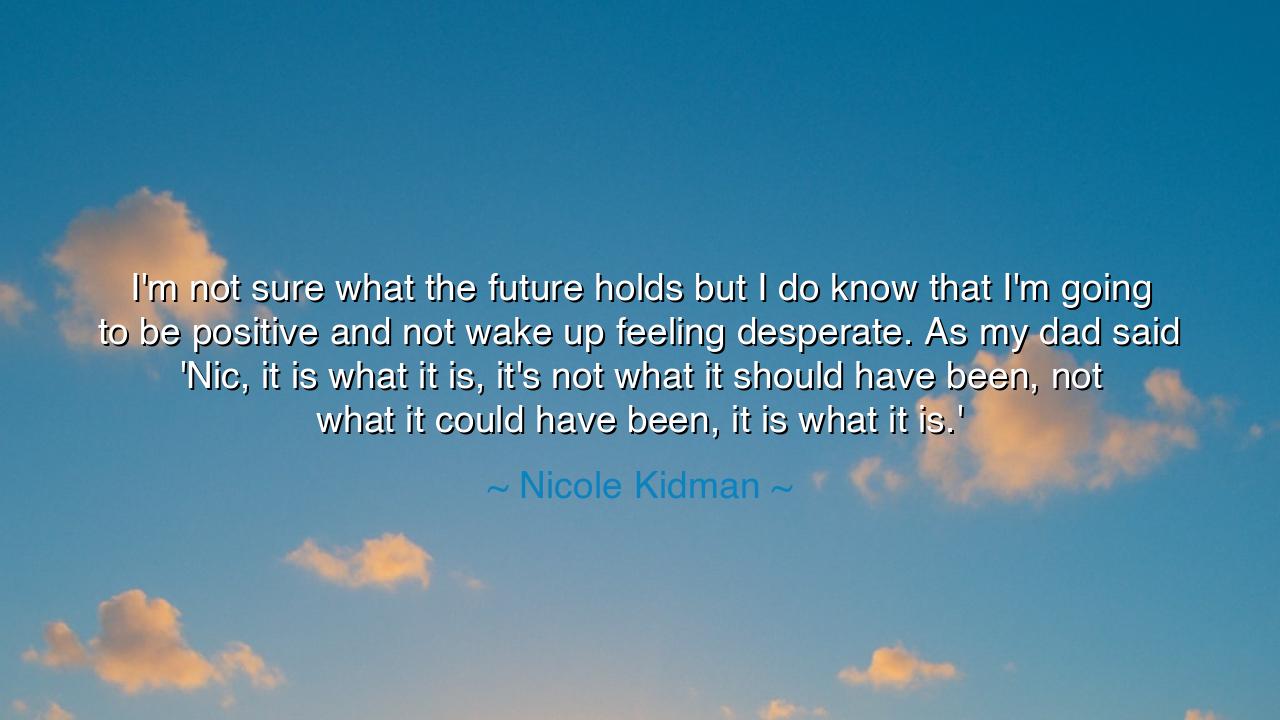
I'm not sure what the future holds but I do know that I'm going
I'm not sure what the future holds but I do know that I'm going to be positive and not wake up feeling desperate. As my dad said 'Nic, it is what it is, it's not what it should have been, not what it could have been, it is what it is.'






"I'm not sure what the future holds but I do know that I'm going to be positive and not wake up feeling desperate. As my dad said 'Nic, it is what it is, it's not what it should have been, not what it could have been, it is what it is.'" These words spoken by Nicole Kidman reflect a deep sense of acceptance and resilience. In a world that often places immense pressure on individuals to control or predict the future, Kidman’s statement offers a refreshing perspective. Rather than being consumed by what could have been or what should have been, she chooses to embrace the present for what it is. Acceptance, as her father wisely advised, allows us to move forward without being trapped in regret or desperation. This attitude encourages a positive mindset, where one faces life's challenges with grace and strength.
In the ancient world, the concept of acceptance was not merely about passivity but about understanding the flow of life and one's place within it. The Stoics, particularly philosophers like Epictetus and Marcus Aurelius, held that what we cannot control should not dominate our hearts and minds. Epictetus, a former slave turned philosopher, famously said, "We cannot choose our external circumstances, but we can always choose how we respond to them." The Stoics believed that by accepting what is, without being consumed by what could or should be, we could cultivate inner peace. Kidman’s father’s wisdom, much like the teachings of the Stoics, emphasizes the importance of focusing on the present moment and letting go of the need to change or control the unchangeable.
Socrates, too, spoke of the importance of living with acceptance in the face of adversity. He believed that true wisdom lay in recognizing our limitations and accepting that there are forces beyond our control—whether they are societal structures, personal circumstances, or the unpredictability of the future. In his famous assertion, "The only true wisdom is in knowing you know nothing," Socrates pointed to the need for humility and acceptance of the unknown. Kidman’s perspective mirrors this ancient insight—by accepting what is and freeing herself from the weight of "what could have been," she embraces the present moment with clarity and strength.
Consider the life of Alexander the Great, a historical figure who faced numerous challenges in his conquests. Despite his military genius and seemingly unstoppable ambition, Alexander was deeply aware of the limitations of human control. During his final years, as he faced an uncertain future and the prospect of his own mortality, he famously spoke to his generals about the need to accept the unpredictable nature of life. In this moment, despite his previous conquests, Alexander demonstrated a profound awareness of his humanity and the inevitability of fate. This ancient example underscores Kidman’s message that we must accept the present, no matter how far removed it may be from our expectations or desires.
Kidman’s quote also touches upon the idea of positivity as an active choice. In the face of uncertainty, many individuals find themselves overwhelmed by feelings of desperation or regret, often consumed by the "what ifs" of life. Yet, as Kidman so wisely puts it, the key is to wake up with the determination to move forward positively, rather than succumbing to the negative forces of the mind. The ancient Romans, too, believed in the power of positive action. Seneca, another Stoic philosopher, wrote about the importance of mindset in shaping our responses to hardship: "We suffer more often in imagination than in reality." In this context, Seneca advises that we actively choose our reactions and cultivate positive habits that allow us to thrive despite difficult circumstances.
The lesson here is profound: acceptance of what is—without the weight of "what should have been" or "what could have been"—is the key to peace and resilience. The Stoics understood that our thoughts and attitudes are the only things we truly control, and by choosing to accept life’s unpredictability with grace, we free ourselves from the chains of regret and despair. Kidman’s reflection, guided by her father’s wisdom, reminds us that positivity is a choice, and through it, we gain the strength to face life’s uncertainties with hope rather than fear.
In your own life, consider how often you dwell on the past or project fears into the future. Ask yourself: How can you choose to accept the present moment for what it is, rather than what it could or should have been? Life will always present challenges and uncertainties, but it is through acceptance and positivity that you will find peace. Like Socrates, Epictetus, and Seneca, embrace the wisdom of recognizing what is beyond your control and focus on the power you have in the here and now. By choosing to accept the present, you are not resigning yourself to passivity, but instead empowering yourself to live with clarity and purpose. The future is unknown, but your response to the present is always within your control.






AAdministratorAdministrator
Welcome, honored guests. Please leave a comment, we will respond soon